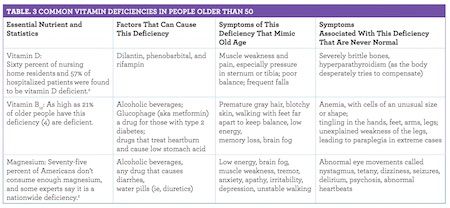Article
Are These Symptoms of Old Age a Vitamin Deficiency?
Author(s):
Some vitamin deficiencies go unnoticed, but insidious vitamin deficiencies can make us miserable.
Some vitamin deficiencies go unnoticed. You are eating healthy and doing everything right, but you have brain fog, low energy, frequent colds, and other infections. Maybe you have blotchy skin that you never had before, so you assume you are getting old, and resign to living with these symptoms. Maybe you do not even mention them to your doctor because you read that healthy people do not need vitamins, and you certainly are healthy.
But insidious vitamin deficiencies can make us miserable. The No. 1 offender discovered in the past 10 years is vitamin D deficiency (Table). Prior to this finding, it was thought that vitamin D deficiency was associated with only bad bones: osteomalacia in adults and rickets in children. These bone diseases usually occur when vitamin D levels are very low.

Then doctors discovered a new range for vitamin D levels. In this range, the bones were healthy, yet health problems persisted. Now we know vitamin D does so much more than just regulate bones. There is a condition called subclinical vitamin D deficiency. Our bodies make less vitamin D as we age; we also absorb less from food sources. Many experts think this is also happening with other vitamins, particularly vitamin B12 and magnesium.1,2 Very common drugs are also depleting these nutrients from our bodies. Blood tests are being refined to measure B12 levels.
Magnesium is more complicated because it resides inside cells. Just 1% of the body’s magnesium is in the bloodstream, which laboratories can test. Therefore, if a magnesium blood level is low, most likely a magnesium deficiency is causing the symptoms. However, often the magnesium blood levels are normal and yet the individual has a magnesium deficiency that goes undetected.3
References
- McBride J. B12 Deficiency May Be More Widespread Than Thought. USDA website. www.ars.usda.gov/news-events/news/research-news/2000/b12-deficiency-may-be-more-widespread-than-thought/. Published August 2, 2000.
- Lundberg G. Magnesium Deficiency: The Real Emperor of All Maladies? Medscape website. http://www.medscape.com/viewarticle/844214. Published May 11, 2015.
- Tangpricha V, Khardori R. Vitamin D Deficiency and Related Disorders. Medscape website. http://emedicine.medscape.com/article/128762-overview. Updated Oct 10, 2016.
Newsletter
Stay informed on drug updates, treatment guidelines, and pharmacy practice trends—subscribe to Pharmacy Times for weekly clinical insights.





